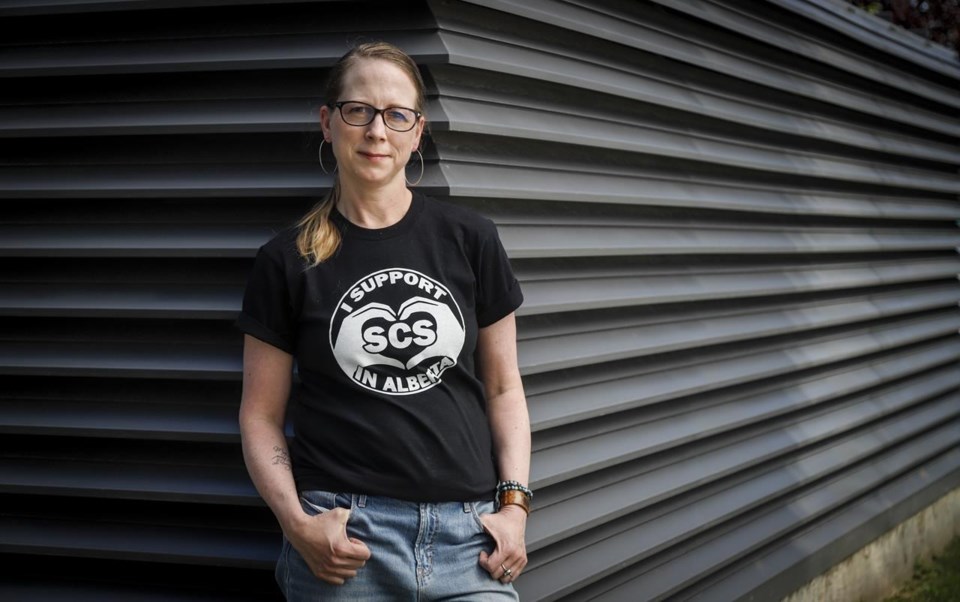CALGARY — Steps away fromCalgary’s only supervised consumption site, a man unknowingly sold an undercover police officer a small amount of methamphetamine — one-fifth of a gram in a clear plastic bag for $10.
Court documents show Michael Hassard was unsure of the man in plain clothes when he asked to purchase drugs, but a woman Hassard knew vouched for the buyer and his friend.
A short time later, Hassard was arrested by uniformed officers. He was charged with trafficking and possession of the proceeds of crime under $5,000.
His arrest was part of an effort by the Calgary Police Service in December 2018 called Operation Desist, which aimed to stifle meth supply and target dealers preying on the vulnerable.
Addictions and legal experts argue the sting failed on both fronts and further victimized an already at-risk group.
Hassard's experience sheds light on covert efforts to criminalize activity surrounding the supervised consumption site and its users, says Rebecca Haines-Saah, an associate professor of community health sciences at the University of Calgary.
With the Alberta government planning to close the Safeworks site,Haines-Saah says it is crucial people understand how policing there influenced public perception and divided opinion on the inner-city service.
A 2018 police report showed a 29 per cent increase in calls for service around Safeworks and a 276 per cent increase in drug-related calls compared with the three-year average.
The United Conservative government stated in a report on drug-use sites in Alberta that the Calgary data indicated "residents' concerns were well-founded." In May, the province cited disruptions in the area for closing the site.
The government confirmed this week that Safeworks will stay open until two new locations for similar services are secured.
Safe consumption sites allow people to use substances under the supervision of trained staff who provide emergency care if an overdose occurs.
Hassard has yet to be sentenced, but has pleaded guilty to both charges. In January, a judge denied the man's request for a stay of proceedings based on a claim of entrapment.
Hassard's lawyer, Robin McIntyre, says people arrested for similar offences have been put behind bars for months to years.
“The moment you've sold drugs, even a small quantity, we're realistically talking jail time,” says McIntyre.
Operations such as Desist can turn people who use substances into sellers by virtue of circumstance, she adds.
"(Police) are offering marginalized and vulnerable individuals the opportunity to commit an offence," McIntyre says. "We see individuals who are hungry … so they may sell off their remaining drugs so they can get some spare change for a sandwich."
One of the undercover officers testified at the stay hearing that "it was possible that drug users might be enticed to sell their drugs on request," but added the operation was grounded in statistics on drug-related calls in the area.
During cross-examination, police did admit the data was limited. Requests for service were not collected in a way that differentiated between drug trafficking, drug use or an overdose. It is also unknown if one person, for example, made multiple calls to police.
In a statement, Calgary police rejected suggestions that Safeworks clients were targeted.
Court documents show undercover officers carried out the operation in six different areas, including the city block that houses Safeworks and a nearby park.
Haines-Saah says targeting dealers won't stop the flow of drugs.
“Targeting people on street level — they’re just replaced with other people and this sometimes leads to turf wars and exacerbates violence."
Once charged, they become part of a "revolving door" in and out of the justice system, which creates barriers to employment, housing and addictions supports.
Edmonton-based lawyer Avnish Nanda says pursuing undercover operations near drug-use sites goes against the spirit of Health Canada drug law exemptions granted to approved operators. Nanda suggests a heavy police presence can deter substance users from the service, which increases the risk of overdoses and unsafe supplies such as used needles.
Health Canada declined to comment on suitable policing around the sites.
Calgary faces record-high drug poisoning deaths this year. Government statistics show that in the first five months, 205 people in the city died from unintentional drug poisonings — a 40.4 per cent increase from the same period in 2020.
Alberta Health Servicessays there have been no deaths among 185,000 visitors to Safeworks since January 2018.
Alberta stripped funding from Lethbridge's safe consumption site last July after allegations of financial misconduct surfaced. They were later proven to be unfounded.
Since the site's closure, the rate of overdose deaths in the southern Alberta city has soared. The figure was 2.5 times higher than the provincial average in May at 83.9 per 100,000 people.
Those who advocate for and work with substance userssuggest policy-makers and police should determine meaningful steps to ensure the success of Calgary's two new sites when they open.
Haines-Saah says one solution is decriminalizing illicit substances.
"We've tried everything else and we know that it's not working," she says. "The stigma of being criminalized, of interacting with law enforcement, is far more costly to our systems and to individuals."
This report by The Canadian Press was first published Aug. 22, 2021.
Alanna Smith, The Canadian Press


